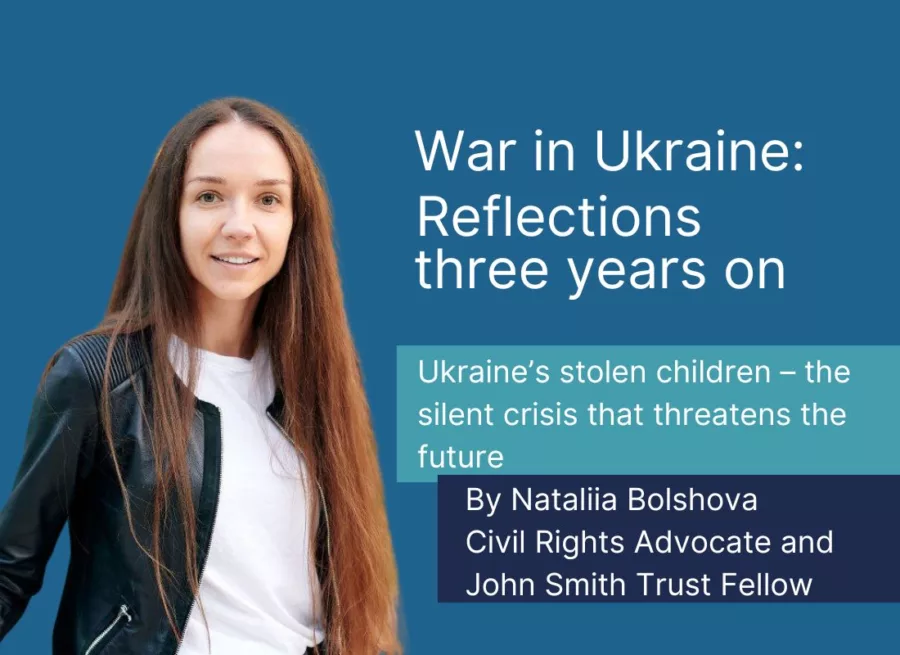Ukraine’s stolen children – the silent crisis that threatens the future

Right now, thousands of Ukrainian children do not know if their parents are alive. Tens of thousands have been taken to Russia, while hundreds of thousands have been lost in a broken system.
Three years into Russia’s full-scale war against Ukraine, the world has witnessed the forced displacement of millions of Ukrainians, the abduction of thousands of children, and the fragmentation of families on a devastating scale. While international attention has rightly focused on Russia’s war crimes and mass deportations, a parallel crisis is unfolding – one that is less visible but just as devastating: the growing number of Ukrainian children permanently separated from their parents not by missiles, but by a fractured legal system, wartime displacement, and institutional inaction.
The scale of the crisis
The numbers tell a tragic story. More than 2.5 million Ukrainian children have been displaced – many evacuated abroad for safety, others left behind while their parents serve in the Armed Forces.[1]
We know that 30% of children who fled Ukraine with one parent have lost all contact with the other parent who remains in Ukraine.[2]
Meanwhile, 80% of children whose parents serve in the Armed Forces have little or no communication with them.[3]
For more than 20,000 Ukrainian orphans and children who lost their parents in the war the heartbreak did not end there. They have been illegally deported to Russia, where efforts to repatriate them have stalled for three years. Many of those abducted before 2014 have already turned 18 and have been forcibly conscripted into the Russian army to fight against Ukraine.
These are not just numbers – these are children whose futures are being erased.
This problem extends beyond Ukraine’s borders. The breakdown of family ties slows the return of refugees, erodes trust in legal institutions, and weakens post-war recovery.
A system unprepared to reunite families
Ukraine’s legal and social systems were never designed to handle the scale of parental separation caused by war. Cases of parental abduction and alienation existed before the invasion, but the war has multiplied their complexity.
Ukraine’s civil courts, law enforcement agencies, and social services do process these cases, but:
- There is no unified system ensuring the protection of children’s rights and the enforcement of court rulings.
- Corruption and bureaucratic inertia often render court decisions unenforceable.
- Family court proceedings can take 2-4 years, by which time a child’s relationship with the alienated parent may already be irreparably damaged.
The burden of these systemic failures falls entirely on the children. Many suffer profound psychological distress, including anxiety, depression, and, tragically, even suicide.
While these are humanitarian tragedies today, they also pose a long-term challenge for Ukraine’s recovery, demographic stability, and national security.
Without urgent reform, Ukraine risks losing an entire generation.
What needs to happen next
Protecting children’s rights must be a core pillar of Ukraine’s recovery and European integration process. This is not just a moral obligation – it is essential for social stability, national resilience, and Ukraine’s credibility as a democratic state.
Legislative reform and diplomatic engagement
The UK and European partners can play a key role in advocating for urgent reforms in Ukraine’s family law system, ensuring alignment with European human rights standards. International legal expertise and diplomatic support can help ensure that these reforms lead to enforceable protections, not just symbolic commitments.
At the same time, strengthening Ukraine’s legal and social institutions and expanding support programmes for affected children and families is critical to delivering real change.
A generation at risk
Ukraine is fighting for its land, but it must also fight for the generation that will rebuild it.
If we do not act today, Ukraine risks losing not just territory, but its future.
The international community has provided weapons, economic aid, and humanitarian assistance. Now, it must help protect Ukraine’s most vulnerable citizens: its children.
Read more about our Fellows’ work in Ukraine
This story was commissioned in collaboration with The Foreign Policy Centre as part of their series War in Ukraine: Reflections three years on
[1] United Nations, ‘Two million refugee children flee war in Ukraine in search of safety across borders’, Press Release, UNICEF, 30 March 2022, https://www.unicef.org/press-releases/two-million-refugee-children-flee-war-ukraine-search-safety-across-borders
[2] Obudsman, ‘deportation of ukrainian children is genocide!’, Ukraine Government, 13 September 2024, https://ombudsman.gov.ua/storage/app/media/uploaded-files/UPF%204.pdf
[3] Maksym Savchuk, ‘From the “Youth Army” to the front: how Russia prepares Ukrainian children under occupation for war against their own country’, Radio Svoboda, 16 November 2024, https://www.radiosvoboda.org/a/skhemy-ukrayinski-dity-yunarmiya-viyna/33203644.html
